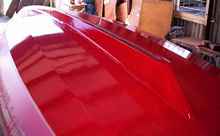Reprinted from Australian Seacraft

MASKING TAPE is the one easy way to achieve a neat paint job
on your boat, when cutting a sharp edge for boot stripe, water
line or other trim. Yet this time-saver has its own special set
of rules which must be observed if you want to avoid peeling,
feathering and sticking.
Larger marine stores often offer a choice of at least three different
masking tape types in various widths. There is the regular tape,
a sharp edge tape which is best for boot tops, and a low-tack
tape with reduced sticking power for use over new paint finishes.
Any of them should be used with some basics in mind.
 |
Masking tape on a paint
job . |
Masking serves two purposes - to save you time and to protect
nearby surfaces. If you're spray painting, this protection has
to include complete coverage against not only overspray but damage
to plastics which can be caused by volatiles. In the presence
of such plastics, any masking must be removed as soon as possible
after spraying because fumes trapped under masking can craze non-glass
windows. Any large-area masking should be done with tape plus
brown paper or other plain, roll paper. Newspaper is cheap and
readily available but it may leak through the tiny holes found
along the top and the ink is sure to leave a stain behind - especially
on new white paint.
Start with fresh masking tape because last year's may have dried,
making it hard to remove later. Lay on the tape, then go along
the edge with your thumbnail to make sure it is stuck right to
the edge. Start the tape, then sight towards the line you want
to make, holding the tape about 200mm (bin) out from the boat
and keeping a little tension on it. Then lower the tape until
it sticks. This works much better than trying to stick on a few
inches at a time. At edges and angles, pull the tape up against
a single-edge razor blade, to ,cut it. At edges where two pieces
of tape cross, take special care td press down the tape to close
the gap. If you're using a paper cover, attach it over the tape
because it's too difficult to achieve an accurate edge when you
re trying to attach paper and tape at the same time.
 |
Side view |
Even the best-laid masking tape may allow paint to creep. To
seal the edge before painting, paint it with primer even if you're
not priming the rest of the boat. You needn't get a brush dirty
just rub on primer with a scrap of cloth. Primer dries so fast,
it seals the tape before it can soak in. The finish coat can now
be laid on without fear of a feather edge after tape comes off.
The final step in proper masking is to get if off in time. Left
to bake in the sun, masking tape can harden and grip until you
can't get it off without either taking some paint or leaving some
tape. In fact, removing the tape while paint is still tacky allows
the edge to smooth out somewhat.
Good Faith Notice: We have used
reasonable endeavours to locate the owners of copyright of this
material. If you are the copyright owner, or know the contact
details of the copyright owner, please contact us.

***** |

